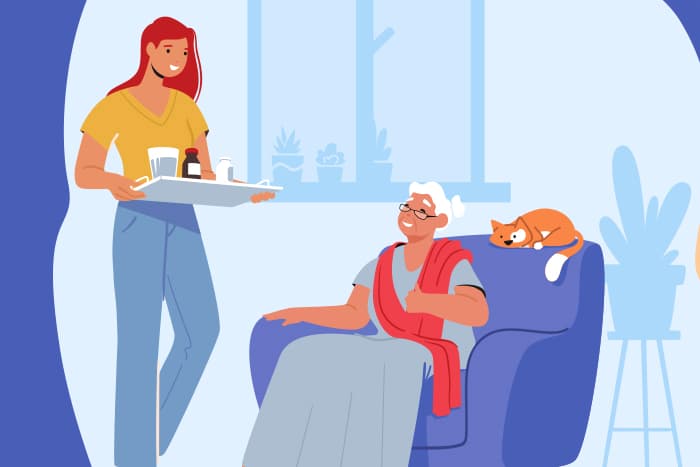As our parents age, ensuring their well-being and managing their affairs can become increasingly complex. One important legal tool that caregivers should understand is the power of attorney (POA) for elderly parents. This powerful document grants an individual, typically an adult child or trusted family member, the authority to make important decisions on behalf of their aging parent. From financial matters to healthcare choices, a POA can provide peace of mind and legal protection for both the elderly parent and their caregiver. In this article, we’ll review what a power of attorney is, the benefits of having one for elderly parents, and how to obtain this document.
What is power of attorney?
Power of attorney is a legal document that grants an individual (known as the agent or attorney-in-fact) the authority to act on behalf of another person (the principal) in specified matters. This document is often used when someone becomes unable to manage their own affairs due to illness, disability, or absence.
There are several types of power of attorney:
General POA: Gives broad powers to the agent to handle various financial and legal matters.
Limited POA: Restricts the agent's authority to specific tasks or time periods.
Durable POA: Remains in effect even if the principal becomes incapacitated.
Medical POA: Allows the agent to make healthcare decisions for the principal.
Springing POA: Only takes effect under specific circumstances, such as the principal's incapacitation.
The agent's responsibilities may include managing finances, making healthcare decisions, handling real estate transactions, or filing taxes. It's vital to choose a trustworthy individual as your agent, as they will have significant control over your affairs.
Why should you become your elderly parent’s power of attorney?
Becoming your elderly parent's POA is a significant responsibility that can greatly benefit both you and your parent. It can be hard to know when to step in, and the process can be complicated if your parents are hesitant to acknowledge the degree of help they require. Here are just some of the reasons you may consider taking on this role and how the outcome can benefit you both:
Ensure Their Wishes are Honored: As POA, you can make decisions that align with your parent's preferences and values, especially when they cannot communicate these themselves.
Quick Decision-Making: In emergencies or time-sensitive situations, having POA allows you to act swiftly without legal barriers.
Financial Management: When you have POA over your parents, you can oversee their finances, pay bills, manage investments, and protect their assets from potential financial exploitation. This helps safeguard their assets while still keeping them closely involved in the decision-making process.
Healthcare Advocacy: With medical POA, you can make crucial healthcare decisions, ensuring your parent receives the care they desire and need.
Reduce Family Conflicts: Having a designated POA can minimize disagreements among family members about care decisions.
Legal Protection: POA provides legal authority to act on your parent's behalf, protecting both you and your parent from potential legal complications.
Peace of Mind: It can feel uncomfortable for aging parents to accept that they need help. Knowing that someone trustworthy is managing their affairs can provide comfort to your parent and reduce stress for the entire family.
Continuity of Care: You can maintain consistent care and decision-making, even if your parent's condition deteriorates. This also helps provide more stability and consistency for your parent during stressful or difficult times.
Simplified Processes: POA can streamline interactions with financial institutions, healthcare providers, and government agencies.
Preparedness for the Future: Having POA in place before it's urgently needed ensures you're ready to step in when the time comes.
By becoming your elderly parent's power of attorney, you're taking a proactive step in safeguarding their well-being and honoring their legacy.
Step-by-Step: How To Get Power of Attorney for Elderly Parents
The process of obtaining power of attorney can seem overwhelming. It can feel uncomfortable to have a conversation with your parent about initiating POA, and the situation should be approached with care and preparation in order to have the best outcome for everyone involved. Here’s how to get started:
Discuss with Your Parent: Have an open, honest conversation about why POA is necessary and how it will benefit them.
Choose the Right Type of POA: Determine whether you need a general, limited, durable, or healthcare POA based on the needs of your parents.
Consult an Attorney: While not always required, professional legal advice can ensure the POA document is properly drafted and complies with state laws.
Prepare the POA Document: Include all necessary information such as your parent's details, your details as the agent, and the specific powers granted.
Ensure Your Parent Is of Sound Mind: The POA must be created while your parent is mentally competent to make decisions.
Have the Document Signed and Notarized: Your parent must sign the document in the presence of a notary public. Some states may require additional witnesses.
Register the POA: In some jurisdictions, you may need to file the POA with the local court or land records office.
Inform Relevant Parties: Notify banks, healthcare providers, and other relevant institutions about the POA.
Keep the Document Safe: Store the original in a secure place and provide copies to necessary parties.
Review and Update Regularly: Circumstances may change, so review the POA periodically to ensure it remains valid and reflects your parent's current wishes.
Becoming your parent's POA is a significant responsibility. Always act in their best interests and maintain open communication with family members to avoid potential conflicts.
Support Your Elderly Parent with The Medicare Helpline
Obtaining power of attorney over a parent is a significant step that requires careful consideration, open communication, and proper legal procedures. While the process may seem daunting, it's an essential measure to ensure your parent's affairs are managed effectively when they're unable to do so themselves. For other ways to support your parents during their golden years, check out The Medicare Helplin’s library of lifestyle articles. You’ll find additional resources and information for healthy aging.
More Lifestyle Articles
